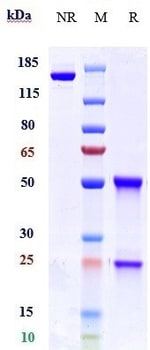Learn More
Invitrogen™ CD317 (BST2, PDCA-1) Monoclonal Antibody (eBio927), Alexa Fluor™ 488, eBioscience™
Rat Monoclonal Antibody
Marke: Invitrogen™ 53-3172-82
Beschreibung
Description: The eBio927 monoclonal antibody reacts with PDCA-1 (BST2, CD317), a specific marker of plasmacytoid dendritic cells (pDC), also known as type I IFN-producing cells (IPC) in the naive mouse. Mouse IPCs are typically CD11c+, CD11b-, B220+, Ly-6C+, and CD62L+. PDCA-1 is predominantly expressed by IPCs in the naive mouse which represents a very minor population (<0.5%) of splenocytes. It is upregulated on numerous cell types following stimulation which triggers an IFN response. PDCA-1 cycles between cell surface and intracellular compartments and may function to regulate trafficking of secreted cytokines. PDCA-1 (BST2) is the protein recognized by antibody 120G8. The eBio927 monoclonal antibody has also been shown to have functional activity. The epitope recognized by eBio927 is distinct from eBio129c; thus, the antibodies can be used to costain, purify and identify pDCs. Applications Reported: This eBio927 antibody has been reported for use in flow cytometric analysis. Applications Tested: This eBio927 antibody has been tested by flow cytometric analysis of mouse splenocytes. This can be used at less than or equal to 1 μg per test. A test is defined as the amount (μg) of antibody that will stain a cell sample in a final volume of 100 μL. Cell number should be determined empirically but can range from 10^5 to 10^8 cells/test. It is recommended that the antibody be carefully titrated for optimal performance in the assay of interest. Excitation: 488 nm; ...
BST2 (CD317, HM1.24 antigen, DAMP-2, tetherin) is an integral membrane protein that is involved in the development and growth of B-cells. The surface expression of BST2 on fibroblast cell lines facilitated the stromal cell-dependent growth of DW34, a pre-B-cell line. BST2 is highly expressed during B-cell development, from pro-B precursors to plasma cells, T-cells, monocytes, NK cells and DCs (at protein level), and myeloma cells. Research studies have shown that BST2 also functions as an inhibitor of retrovirus release from human cells whose activity is antagonized by the HIV-1 accessory protein, Vpu. While BST2 causes retention of virions on cell surfaces or endocytosis into BST2-positive compartments, its depletion abolished the viral requirement for Vpu for virus release, an activity that may represent a potential therapeutic strategy for the treatment of HIV/AIDS. Another disease associated with BST2 dysfunction is stomatitis.
Spezifikation
| CD317 (BST2, PDCA-1) | |
| Monoclonal | |
| 0.5 mg/mL | |
| PBS with 0.09% sodium azide; pH 7.2 | |
| Q8R2Q8 | |
| Bst2 | |
| Affinity Chromatography | |
| RUO | |
| 69550 | |
| 4°C, store in dark, DO NOT FREEZE! | |
| Liquid |
| Flow Cytometry | |
| eBio927 | |
| Alexa Fluor 488 | |
| Bst2 | |
| 2310015I10Rik; bone marrow stromal antigen 2; bone marrow stromal cell antigen 2; Bst2; BST-2; C87040; CD317; Damp1; DAMP-1; DAMP-1 protein homolog; GREG; HM1.24 antigen; NPC-A-7; PDCA-1; protein DAMP-1; TETHERIN | |
| Rat | |
| 100 μg | |
| Primary | |
| Mouse | |
| Antibody | |
| IgG2b κ |
Produktvorschläge
Customers who viewed this item also viewed.
Bitte geben Sie uns Ihr Feedback zu den Produktinhalten, indem Sie das folgende Formular ausfüllen.
















